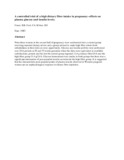| dc.contributor.author | Fraser, RB | |
| dc.contributor.author | Ford, FA | |
| dc.contributor.author | Milner, RD | |
| dc.date.accessioned | 2013-06-10T13:01:44Z | |
| dc.date.available | 2013-06-10T13:01:44Z | |
| dc.date.issued | 1983 | |
| dc.identifier.citation | Diabetologia. 1983 Sep;25(3):238-41 | en |
| dc.identifier.uri | http://hinari-gw.who.int/whalecomwww.ncbi.nlm.nih.gov/whalecom0/pubmed/6315514 | |
| dc.identifier.uri | http://erepository.uonbi.ac.ke:8080/xmlui/handle/123456789/30873 | |
| dc.description.abstract | Non-obese women in the second half of pregnancy were randomised into a control group receiving standard dietary advice and a group advised to make high fibre whole-food substitutions in their diets at every opportunity. Glucose and insulin profiles were performed over 24-h periods at 29 and 35 weeks gestation when the diets were equivalent in available carbohydrate, protein and fat, but the control group ingested 12.4 g dietary fibre/24 h and the high fibre group 51.4 g/24 h. Glucose homeostasis was similar in both groups but there was a significant attenuation of post-prandial insulin secretion in the high fibre group. It is suggested that the characteristic post-prandial peaks of plasma insulin observed in Western pregnant women are an unphysiological response to dietary fibre depletion. | en |
| dc.language.iso | en | en |
| dc.title | A controlled trial of a high dietary fibre intake in pregnancy--effects on plasma glucose and insulin levels. | en |
| dc.type | Article | en |
| local.publisher | College of Health Sciences, University of Nairobi | en |

